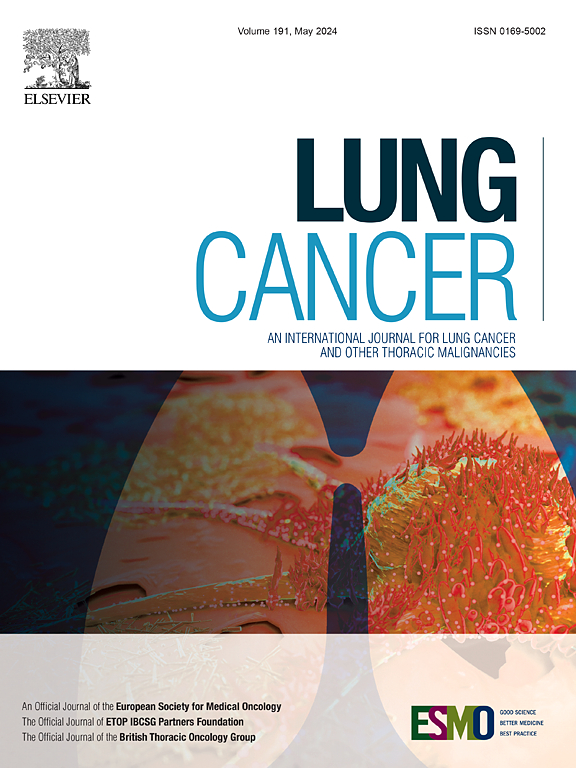表皮生长因子受体(EGFR)阳性 NSCLC 术后复发患者与新发不可切除疾病患者的奥希替尼疗效差异:前瞻性观察研究
IF 4.5
2区 医学
Q1 ONCOLOGY
引用次数: 0
摘要
背景虽然晚期非小细胞肺癌(NSCLC)全身化疗的临床试验包括术后复发和新发不可切除病例,但术后复发的疗效和预后据报道更好。方法我们对一项多中心、前瞻性、观察性研究进行了事后分析,该研究评估了表皮生长因子受体(EGFR)阳性NSCLC患者一线使用奥希替尼的疗效。研究将患者分为两组:术后复发组(复发组,n = 167)和从头罹患不可切除疾病组(从头组,n = 385)。结果复发组的东部合作肿瘤学组表现状态(ECOG-PS,p < 0.001)、骨转移(p <0.001)、脑转移(p <0.001)、癌性胸膜炎(p = 0.006)、胸膜播散(p = 0.003)、肝转移(p = 0.017)和肾上腺转移(p = 0.009)。复发组的无进展生存期(PFS)和总生存期(OS)明显优于从头开始组(危险比[HR] = 0.62,95 %置信区间[CI],0.49-0.81,p < 0.001;HR = 0.58,95 %置信区间[CI],0.43-0.79,p < 0.001)。在1:1倾向得分匹配分析中,匹配复发组的PFS和OS明显优于匹配新生组(HR = 0.72, 95 % CI, 0.52-0.99, p = 0.034; and HR = 0.65, 95 % CI, 0.44-0.95, p < 0.结论与新发不可切除性疾病患者相比,EGFR阳性NSCLC术后复发患者在开始一线奥希替尼治疗时ECOG-PS更好,远处转移更少,PFS和OS更好。在未来晚期表皮生长因子受体(EGFR)阳性 NSCLC 的临床试验中,术后复发应被视为一个分层因素。本文章由计算机程序翻译,如有差异,请以英文原文为准。
Difference in efficacy of osimertinib between patients with EGFR-positive NSCLC with postoperative recurrence and those with de novo unresectable disease: A prospective, observational study
Background
Although clinical trials of systemic chemotherapy for advanced non-small-cell lung cancer (NSCLC) have included both postoperative recurrence and de novo unresectable cases, postoperative recurrence is reported to have a better efficacy and prognosis. However, there are no efficacy data of first-line osimertinib for postoperative recurrence.
Methods
We conducted a post hoc analysis of a multicenter, prospective, observational study that evaluated the efficacy of first-line osimertinib in patients with epidermal growth factor receptor (EGFR)-positive NSCLC. The patients were divided into two groups: those with postoperative recurrence (recurrence group, n = 167) and those with de novo unresectable disease (de novo group, n = 385).
Results
The recurrence group had a significantly better Eastern Cooperative Oncology Group performance status (ECOG-PS, p < 0.001) and fewer bone metastases (p < 0.001), brain metastases (p < 0.001), cancer pleurisy (p = 0.006), pleural dissemination (p = 0.003), liver metastases (p = 0.017), and adrenal metastases (p = 0.009) at the start of osimertinib than the de novo group. The recurrence group had a significantly better progression-free survival (PFS) and overall survival (OS) than the de novo group (hazard ratio [HR] = 0.62, 95 % confidence interval [CI], 0.49–0.81, p < 0.001; and HR = 0.58, 95 % CI, 0.43–0.79, p < 0.001, respectively). In a 1:1 propensity score-matching analysis, the matched recurrence group had significantly better PFS and OS than the matched de novo group (HR = 0.72, 95 % CI, 0.52–0.99, p = 0.034; and HR = 0.65, 95 % CI, 0.44–0.95, p < 0.001, respectively).
Conclusion
Patients with EGFR-positive NSCLC and postoperative recurrence have a better ECOG-PS and fewer distant metastases at the start of first-line osimertinib, and better PFS and OS than those with de novo unresectable disease. Postoperative recurrence should be considered as a stratification factor in future clinical trials for advanced EGFR-positive NSCLC.
求助全文
通过发布文献求助,成功后即可免费获取论文全文。
去求助
来源期刊

Lung Cancer
医学-呼吸系统
CiteScore
9.40
自引率
3.80%
发文量
407
审稿时长
25 days
期刊介绍:
Lung Cancer is an international publication covering the clinical, translational and basic science of malignancies of the lung and chest region.Original research articles, early reports, review articles, editorials and correspondence covering the prevention, epidemiology and etiology, basic biology, pathology, clinical assessment, surgery, chemotherapy, radiotherapy, combined treatment modalities, other treatment modalities and outcomes of lung cancer are welcome.
 求助内容:
求助内容: 应助结果提醒方式:
应助结果提醒方式:


